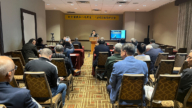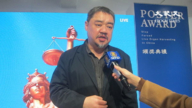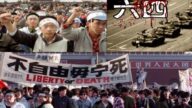【新唐人2013年11月27日讯】日前,北京89民运学生领袖吾尔开希飞抵香港,第四次向中共当局“投案”,他想借此机会回中国与父母见面,但遭香港当局强行遣返。吾尔开希指出,中共当局通缉他多年,却四度拒绝他投案,非常荒诞。外界认为,中共拒绝旅居海外的异议人士回国探望自己的父母,足以看出,中共的所谓“看望父母法”,只是为减轻养老负担。
11月25号,“六四”学生领袖吾尔开希,在香港机场停留超过六小时,他要求香港特区政府将他逮捕,并转交中共。经过4个多小时的交涉,香港入境处正式拒绝他入境,并将他强行送上一班飞往台湾的航班遣返。
自2009年以来,吾尔开希先后在澳门、东京和美国华盛顿,试图进入中国或中国大使馆投案,都遭到拒绝。
“六四”学生领袖吾尔开希:“我要求他们引渡我回中国,如果我(被)判刑的话,至少他们(父母)还可以探监吧,希望他们(中共当局)能够早点让我回家,追求回家的目地不会停止,我一定会回到中国。”
原大陆史学教授刘因全,目前旅居美国。他离开中国已经13年了,13年来他从来没有回去过。他的父母亲已经80高龄,去年,刘因全父亲连续7次重病住院,他很想回国探视父亲,因遭到中共大使馆拒绝换发护照,而无法回去尽孝道。
原大陆史学教授刘因全:“有的时候想偷渡回去,偷渡回去哪怕坐牢也许能够看望父母一眼也好,但是就是不行,我父亲一直到去世,我也不能回去,去世了以后安葬,也不能回去,这一生一世就不能再见父亲一面,惨无人道的一种折磨哪,和杀了我们没甚区别。”
中共在历次政治运动中不断树敌,只要是中共认为可能对它政权构成威胁的人,在肉体上消灭,人格上侮辱的同时,一概要求他们的亲人与他们划清界线,而造成父子相残的惨剧。
前一阵被判处无期徒刑的中共前重庆市委书记薄熙来,在文革期间,不惜踩断自己父亲三根肋骨,来表现自己对中共的衷心。
1970年,16岁的“红卫兵”张红兵,写所谓检举信,举发自己母亲在家里的言行,两个月后张红兵母亲遭到枪决。 30多年来,张红兵常常在梦里见到母亲,并嚎啕大哭,现在张红兵忏悔不已,认为自己犯了弑母罪。
刘因全:“中共这样做的目地有两点,第一点是彻底的摧毁中国的传统文化,让所谓的马列主义、毛泽东思想在中国占有统治地位,因为中国的传统文化是讲究孝道为先的。第二,彻底的泯灭人性,完全听共产党的话。”
15号,中共官媒报导,北京清河87岁的于奶奶,独自一人,靠做零时工养活7个孩子,如今老大已经去世,其他6人因为抚养费问题,把母亲遗弃在急救车上,而母亲身上磨得透光的衣服,还是自己20多岁时买的,母亲在接受媒体采访时,还直夸自己的孩子都是好孩子,她非常渴望有一个孩子能来见见她,喂他一口饭。
今年7月1号,中共所谓《老年人权益保障法》开始实施,其中规定“与老年人分开居住的家庭成员,应当经常看望或者问候老年人,否则将构成违法。”
刘因全指出,中共破坏孝道为先,现在开始承受恶果,却又制造出所谓的“孝子法”,来减轻因养老带来的负担。
刘因全:“也看出中共的这种虚伪,你不从根本上来恢复中华民族的这种美德,抛弃以斗为核心的这种斗争哲学,只是规定儿女去看望父母,能解决问题吗?它不从心里解决,看一看有什么用处。”
刘因全指出,中共拒绝吾尔开希回中国看望自己的父母,是在带头破坏所谓的“孝子法”,同时也说明子女必须探望自己父母的所谓法律规定,只是一纸空文。
采访编辑/刘惠 后制/钟元
Wuer Kaixi’s Fourth Attempt to Return to China Fails
The 1989 Tiananmen student movement leader Wuer Kaixi
has failed in his fourth attempt to surrender himself
to the Chinese Communist Party’s regime.
Hong Kong authorities deported Wuer Kaixi,
who wanted to visit his parents in China.
Wuer Kaixi says it’s absurd that the regime has rejected his
surrender four times, as he’s on China’s most wanted list.
Commentators say that dissidents’ being able to return
to visit their parents shows that the regime’s so-called
“law to visit parents" is just to release the pension burden
from the government.
On Nov. 25, Wuer Kaixi, the student leader of the 1989
pro-democracy movement, arrived in the Hong Kong airport.
For six hours, he demanded the Hong Kong authorities
to arrest him and hand him over to the Communist regime.
After hours of negotiation, Hong Kong immigration officials
refused his request and forcibly deported him to Taiwan.
Since 2009, Wuer Kaixi has unsucessfully tried
to enter China or surrender to Chinese consulates via Macau,
Tokyo and Washington D.C.
Wuer Kaixi, leader in the 1989 pro-democracy movement:
“I asked them to extradite me back to China.
If I’m sentenced, at least they (my parents) can see me
in prison.
I hope they (the CCP regime) will let me go home sooner.
I won’t end my pursuit to return. I will return to China."
Former China-based history professor Liu Yinquan
currently lives in the U.S.
For the past 13 years, he has been unable to go back to China.
His parents are over 80 years old.
Last year, his father was hospitalized 7 times for illnesses.
He has wanted to visit his father, but the Chinese Embassy
refused to renew his passport, leaving him unable
to fulfill his filial piety.
Liu Yinquan, former history professor:
“Sometimes I considered sneaking back into China, even if
it were just once before being jailed.
But I can’t get to see them, not even after my father dies,
not even for the funeral.
I’ll never get to see my father again.
It is such a torture, inhumane, and it’s like killing us."
The CCP has developed enemies
via constant political movements.
While those who were considered a threat to its ruling
will be killed and insulted,
and their families are demanded to draw lines between them.
Tragedies such as father and son hurting each other
become the norm.
During the Cultural Revolution, former party secretary
Bo Xilai expressed his loyalty to the CCP by stomping on
his father, breaking three of his ribs.
In 1970, the 16-year-old Red Guard Zhang Hongbing, wrote
a letter to report on his mother’s words and deeds at home.
Two months later, Zhang Hongbing’s mother was executed.
For 30 years, Zhang Hongbing often dreamt of his mother,
and cried in his dreams.
Zhang says he apologizes with great regret
for killing his mother.
Liu Yinquan: “The CCP has two goals. One is to
completely destroy the traditional Chinese culture so that
the Marxism-Leninism and Maoism will dominate in China.
Filial piety is almost central to traditional Chinese culture.
The CCP’s second goal is to make all submit to the CCP
by fully eliminating human nature."
On the 15th, CCP official media reported that an 87-year-old
woman in Beijing surnamed Yu had raised 7 children
on her own, working temporary jobs.
The eldest son has passed away.
Her six remaining children refuse to take care of her because
of unsettled elderly support, leaving her in an ambulance.
She wore a tattered shirt she bought when she was in her 20s.
During the media interview, she complimented her children
as being good kids and said she longs for one of them to visit
her and feed her food.
On July 1, the “Elderly Protection Law" went into effect,
requiring those living apart from their elderly relatives to
regularly visit them, or else they are breaking the law.
Liu Yinquan says that the CCP has ruined filial piety
and now faces the consequences.
He says the CCP is only using the Elderly Protection Law to
avoid the pension issue, and transfer the burden to the people.
Liu Yinquan: “It also shows this hypocrisy of the CCP.
Rather than recovering the virtue of the traditional Chinese
culture, and abandoning the philosophy of struggle,
they order people to visit their parents.
Can this solve the problem? If it’s not resolved psychologically,
what use is it to make them (visit their parents)?"
Liu Yinquan says that the CCP’s rejecting Wuer Kaixi’s wish
to visit his parents in China takes the lead in breaking the law.
It also shows that this so-called Elderly Protection Law is
just as superficial as a piece of paper.
Interview & Edit/LiuHui Post-Production/ZhongYuan



























